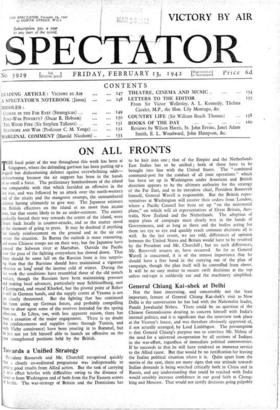Towards a Unified Strategy
President Roosevelt and Mr. Churchill recognised quickly that a closely co-ordinated programme was indispensable to iettipg good results from Allied action. But the task of carrying It into effect bristles with difficulties owing to the distance of Lond in from Washington and of both from the Far Eastern scenes b The war-strategy of Britain and the Dominions has
to be knit into one ; that of the Empire and the Netherlands East Indies has to be unified ; both of these have to be brought into line with the United States. The " combined command-post for the conduct of all joint operations " which has been set up in Washington under American and British direction appears to be the ultimate authority for the strategy of the Far East, and to its executive chief, President Roosevelt himself, General Wavell is responsible. But the British repre- sentatives at Washington will receive their orders from London, where a Pacific Council has been set up "on the ministerial plane," on which will sit representatives of Great Britain, Aus- tralia, New Zealand and the Netherlands. The adoption of major plans of campaign must clearly rest in the hands of Governments, and as long as these and the bodies acting for them see eye to eye and quickly reach common decisions all is well. In the last resort, we are told, differences of opinion between the United States and Britain would have to be resolved by the President and Mr. Churchill ; but no such differences, Mr. Roosevelt assures us, have occurred. So far as General Wavell is concerned, it is of the utmost importance that he should have a free hand in the carrying out of the plan of campaign, though the plan itself will be controlled from above. It will be no easy matter to ensure swift decisions at the top unless red-tape is ruthlessly cut and the machinery simplified.


























